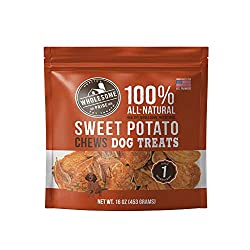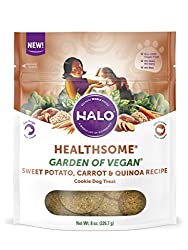
Ritz crackers, like other quick and convenient snacks, can be eaten by themselves or with toppings. My mom likes to add hummus with roasted banana peppers between two Ritz crackers. While she crunches away at the crackers, my dogs would sit there and give her the puppy eyes. My mom would fall for it and hand them each a Ritz cracker but I wonder if Ritz crackers are safe for dogs to eat.
Can dogs eat Ritz crackers? No, dogs should not eat Ritz crackers. Eating even a few Ritz crackers can do harm to your dog’s health. That’s because Ritz crackers are packed full of sugar, salt, carbohydrates, and gluten. Ritz crackers would not be good for dogs with wheat allergies. Additionally, there are several ingredients in Ritz crackers that are dangerous to dogs.
Table of Contents
Can dogs have Ritz crackers?

While Ritz crackers are not toxic to dogs, they are not the healthiest choice for dogs either. We will discuss the ingredients in the Ritz crackers in more detail later but generally, they are not good for dogs with soy, wheat, or gluten allergies.
Ingredients in Ritz crackers that are harmful to dogs
- Unbleached enriched flour: Wheat flour, niacin, reduced iron, thiamine mononitrate (vitamin B1), riboflavin (vitamin B2), and folic acid.
- Vegetable oil: Soybean, canola, palm, and partially hydrogenated cottonseed oil.
- Sugar.
- Salt.
- Leavening: Baking soda and calcium phosphate.
- High fructose corn syrup.
- Soy lecithin.
- Malted barley flour.
- Natural flavor.
Let’s discuss each one and find out which ingredients in Ritz crackers are unsafe for doggy consumption as well as the dog’s health.
Unbleached enriched flour is harmful to dogs that are gluten or wheat intolerant
The primary ingredient in Ritz crackers is unbleached enriched flour. Unbleached flour is fine for dogs, but it isn’t the best for them. Dog owners should choose flour that is safe and healthy for dogs such as Amaranth flour, whole-grain wheat flour, oat flour, coconut flour, brown rice flour, buckwheat flour, and almond flour.
Unbleached enriched flour is not whole grain. Additionally, enriched flour means that most of the natural minerals and vitamins were extracted. This is why you see niacin, reduced iron, thiamine mononitrate (vitamin B1), riboflavin (vitamin B2), and folic acid on the Ritz crackers nutrition label because these essential vitamins and minerals were added back in.
Since unbleached enriched flour is wheat, please do not feed Ritz crackers to your pups if they have a wheat allergy. If you feed your pups wheat or gluten when they are wheat or gluten intolerant, it can damage their gastrointestinal tract because their immune system will treat the GI tract as dangerous and attack it.
Dogs with gluten allergies will show the following signs and symptoms:
- Intestine inflammation.
- Itchy skin leading to frequent licking and chewing of the skin and feet.
- Poor skin conditions.
- Diarrhea.
- Poor hair or balding spots.
- Paw pads are inflamed and red from itchiness.
- Chronic ear infections.
Vegetable oil used to make Ritz Crackers is not safe for dogs
The vegetable oils used to make Ritz crackers are not safe for doggy consumption. For example, vegetable oil that is used in Ritz crackers includes soybean, canola, palm, and partially hydrogenated cottonseed oil. None of these are not good or healthy for dogs.
Dog owners should only give their pooch the following type of oils:
- Coconut oil.
- Fish oil.
- Sunflower oil
- Olive oil.
- Flaxseed oil.
Additionally, some dogs may have soy allergies. Keep Ritz crackers away from your pooch if they are allergic to soy.
Signs of soy allergies in dogs include:
- Dogs scratching their ears or shaking their heads due to ear canal infections.
- Hair loss due to excessive licking of hair and skin.
- Diarrhea.
- Vomiting.
- Eyelids inflammation or blepharitis.
- Ear infection due to yeast or bacteria.
- Seborrhea or itchy skin rash with white scales.
- Recurring pyoderma or skin infection with pus forming under the skin.
Eating excessive sugar can cause canine obesity

In one serving size or 5 Ritz crackers, there is 1 gram of sugar. While it may not be a lot, it is definitely a lot for our canine friends. Dogs get their necessary sugar intake in the form of carbohydrates from their regular dog food. They do not need extra sugar.
Extra sugar intake can cause long-term health issues such as diabetes, weight gain, changes in your dog’s metabolism, and even pancreatitis.
Your pooch may also have dental issues such as cavities and enamel loss. The reason is that the acid in your dog’s mouth uses the sugar that is stuck in between their teeth to produce acids. This acid is bad for your canine’s teeth because it eats away at their enamel which is the outer coating of the teeth. This will lead to dental disease.
Consuming too much sugary food can also cause immediate health problems such as upset stomachs in dogs. They may throw up or have bloody diarrhea.
High fructose corn syrup is extra sugar that dogs don’t need
Speaking of sugar, high fructose corn syrup is even sweeter than regular table sugar. In fact, sugar in all forms, whether regular sugar or high fructose corn syrup, is bad for dogs.
Additionally, high fructose corn syrup is not natural. It is highly processed and may even contain mercury, which is a contaminant that the FDA does not regulate. It is a sweetener that can cause dental problems in dogs.
For this reason, we highly recommend that dog owners avoid feeding their pooch food or treat with high fructose corn syrup.
Ingesting excessive salt can cause sodium poisoning in dogs
In one serving or 5 Ritz crackers, there is 105 mg of sodium. If your pups eat 5 Ritz crackers, they may go over their daily sodium intake.
If your canine companion has high blood pressure, heart disease, liver disease, or kidney disease, avoid feeding snacks or treats that are high in sodium. Doing so can worsen their health. Older dogs are more prone to these health problems so it is best to avoid feeding them Ritz crackers.
Consuming too much salt can cause salt poisoning. Signs of sodium poisoning in dogs include:
- Nausea.
- Diarrhea.
- Vomiting.
Dog owners should avoid feeding their canine companions more than 1.5 grams of salt per pound of their body weight. Going over this limit can be lethal and fatal for dogs.
Leavening is harmful to dogs
Leavening agents are harmful to dogs, whether they are yeast, baking powder, or baking soda. The leavening agents used in Ritz crackers can cause the following in our canine friends:
- Heart problems.
- Seizures.
- Spasms.
Since these signs and symptoms don’t show immediately, if you suspect your pooch has ingested a few Ritz crackers, make sure to bring him to the vet immediately.
Fun Fact: Those crunchy crackers such as the cheesy Goldfish snack will usually include leavening agents as one of the ingredients because it helps to give the crackers their texture.
Soy lecithin is not healthy for canines and not great for dogs with soy allergy
While lecithin is good and is commonly found in your regular dog food, soy lecithin is not. Soy lecithin is from soy as the name suggests and soy is usually genetically modified. Additionally, soy lecithin is a waste product.
It’s easy to get the two confused when you’re reading the ingredients. In fact, as dog owners ourselves, we almost didn’t catch this as well.
We highly recommend that dogs avoid soy products. If your furry family members are allergic to soy, avoid feeding them Ritz crackers.
Malted barley flour is harmful to dogs with a gluten allergy
Since malted barley flour contains gluten, you should avoid feeding Ritz crackers to your pooch if they have a gluten allergy. Malted barley flour also contains tannins. When dogs ingest food with tannins, they can experience the following symptoms:
- Ulcers.
- Upset stomach.
- Seizures.
- Kidney damage.
The Ritz crackers nutrition label clearly states that its food product has the following Allergens:
- Soybeans.
- Wheat.
- Cereals containing gluten.
If you know your pooch has soy, wheat, or gluten allergy it’s best to avoid feeding them Ritz crackers. Consult with your vet if you are not sure. The vet will perform a series of tests to confirm any allergies that your pooch has.
Are Ritz crackers bad for dogs?
Ritz crackers are bad for dogs because they are high in carbohydrates, fats, salt, and sugar. They also contain wheat, soy, and gluten. As a general rule, it’s best to avoid feeding our four-legged friends food with soy in it.
Let’s quickly go over each in more detail.
Dogs don’t need carb and Ritz crackers are high in carbohydrates
Our furry friends do not need that many carbohydrates in their diet to stay healthy. In fact, they don’t need carbohydrates in their diet at all to sustain life. When it comes to our canine friend’s diet, protein is key and they usually get that from meat.
Our pup should be getting their daily carbohydrate intake from their regular dog food. Their main meals should provide them with enough carbohydrates for the day. This is why it is unnecessary to add any more carbs to their diet.
Since one serving or 5 Ritz crackers contain 10 grams of carbohydrates, that is way too much carb consumption for dogs if they accidentally ate 5 Ritz crackers.
Here’s what can happen if your canine friends consume too many carbohydrates:
- Protein deficiency disease(in severe cases).
- Produce a lot of stool.
- Dogs aren’t as active.
- Increase energy and time to digest the food.
Excessive salt is harmful to a dog’s health
Our canine pups should receive their daily salt intake from their main meal. Eating snacks such as Ritz crackers that contain high levels of salt can be detrimental to our furry friend’s health.
When dogs chomp down on snacks with too much salt, they can get extremely thirsty. With extreme thirst comes frequent urination. If your pooch munch on a few Ritz crackers, make sure to keep an eye on him and check for dehydration.
It only takes one serving or 5 Ritz crackers to ingest 105 mg of salt. Your pooch does not need this excessive amount of salt.
Fats can cause canine obesity
There is 4.5 grams of fat in one serving of Ritz crackers. Consuming snacks with high fat content can cause weight gain in dogs. Fats contain calories and your pooch would be taking in that extra calorie that they don’t need.
Sugar can cause diabetes in dogs
If you leave the Ritz crackers out, your pooch will not think twice before chomping down on some if not all of them. This is dangerous because excessive sugar consumption can lead to diabetes, weight gain, and eventually canine obesity.
Are Ritz crackers good for dogs?

If your pups are giving you the puppy eyes and you give in, you can give them one or two Ritz crackers. Be careful not to feed them anymore than this.
Dogs may receive the following health benefits from eating one or two Ritz crackers.
Protein
There is 1 gram of protein in one serving size or 5 Ritz crackers. Protein provides your dogs with energy and helps to build their muscles. It also helps them feel full for a longer period of time.
However, we believe that dogs should still get their protein intake from dog-friendly food such as chicken or eggs instead of Ritz crackers.
Calcium
There is 20mg of calcium in one serving size or 5 Ritz crackers. Calcium is essential to building strong bones and teeth. In fact, calcium helps maintain proper muscle function in dogs and can help with blood clots. Overall, calcium helps to prevent restlessness and muscle twitching in dogs.
While Ritz crackers provide calcium, we highly recommend that dogs get their daily calcium intake from vegetables such as Brussel sprouts, broccoli, or kale.
Iron
There is 1mg of Iron in one serving size or 5 Ritz crackers. Iron can help with the following in dogs:
- Prevent anemia.
- Transport oxygen.
- Proper enzyme functions.
It’s best for our furry friends to receive their iron intake from red meat such as beef, fish heads or fish meat, or organ meats.
Ritz crackers nutrition
Ritz crackers nutrition facts (1 serving size of 5 crackers or 16g)
| Name, Unit | Amount |
| Calories, cal | 80 |
| Total Fat, g | 4.5 |
| Saturated Fat, g | 1 |
| Sodium, mg | 105 |
| Total Carbohydrate, g | 10 |
| Sugar, g | 1 |
| Protein, g | 1 |
| Calcium, mg | 20 |
| Iron, mg | 1 |
| Potassium, mg | 13 |
Let’s take a look at the nutritional fact of 1 Ritz cracker.
Ritz crackers nutrition facts (1 cracker or 3.2g)
| Name, Unit | Amount |
| Calories, cal | 16 |
| Total Fat, g | 0.9 |
| Saturated Fat, g | 0.2 |
| Sodium, mg | 21 |
| Total Carbohydrate, g | 2 |
| Sugar, g | 0.2 |
| Protein, g | 0.1 |
| Calcium, mg | 4 |
| Iron, mg | 0 |
| Potassium, mg | 3 |
Healthy canine-friendly substitute for Ritz crackers
Instead of Ritz crackers, it’s best to go with low-calorie and whole-grain treat options for our canine friends. We feed our pooch these dog-friendly treats:
So, can dogs eat Ritz crackers?
When it comes to our dogs’ food and diet, not all human food or ingredients are suitable or safe for them. Before feeding your canine friends, double-check the list of ingredients on the packet. It’s important that we don’t just casually give dogs our snacks or food. Doing so can harm their health, both immediately and over the long term.
Our furry friends will eat just about anything, even food that may be dangerous to them. As responsible pet owners, it’s our job to make sure we keep toxic food and snacks away from our precious pooch.
Related Questions
While one or two Ritz crackers won’t hurt your dog, eating more than five Ritz crackers may be harmful. That’s because the Ritz crackers are high in salt, sugar, carbohydrates, and fats. Please try to avoid feeding your pooch Ritz crackers regularly and doing so may lead to canine obesity and diabetes.
No, dogs should not eat Ritz crackers with peanut butter. Ritz peanut butter crackers are harmful to dogs because they are high in sodium, carbohydrates, and fats. These three combinations would affect your dog’s health, both in the short-term and over the long run.
Be careful not to feed your canine friends Ritz peanut butter crackers regularly as too much of it can cause canine obesity, pancreatitis, and even sodium poisoning. One or two Ritz peanut butter crackers should be fine, but more than that can do damage.
One or two Ritz bites won’t hurt your dog but eating more than that can have harmful and negative health consequences. If you plan to feed your dog Ritz bites as a rare occasional treat, then that should be fine. However, feeding your furry friend too many Ritz bites can add extra and unnecessary fat to your dog’s diet. Too much fat consumption can lead to weight gain and even pancreatitis in dogs.
Similar to how Ritz crackers are not good for dogs, they are not good for puppies either. Puppies require a nutritious well-balanced diet during growth and development and feeding them Ritz crackers can do more harm than good. Avoid feeding your puppies Ritz crackers because they are packed full of carbohydrates, salt, sugar, and gluten.
DISCLAIMER: THIS WEBSITE DOES NOT PROVIDE MEDICAL ADVICE
The information, including but not limited to, text, graphics, images and other material contained on this website are for informational purposes only. No material on this site is intended to be a substitute for professional veterinary advice, diagnosis, or treatment. Always seek the advice of your veterinarian or other qualified health care provider with any questions you may have regarding dietary needs.
RITZ CRACKERS is a registered trademark of INTERCONTINENTAL GREAT BRANDS LLC. Dogleashpro does not claim any ownership of the RITZ CRACKERS name, logo, or any identifying mark in any way. This article is for educational purposes only.
Resources:
https://en.wikipedia.org/wiki/Ritz_Crackers
https://www.snackhistory.com/ritz-crackers

With over five years of specialized experience as an animal writer, my expertise lies in dog nutrition, health, behavior, grooming, and training. I am dedicated to delivering helpful and informative content that caters to the well-being of our furry friends. My primary goal is to empower pet owners with knowledge and ensure our canine companions thrive in health and happiness. In my free time, I love volunteering at local dog rescue centers.











